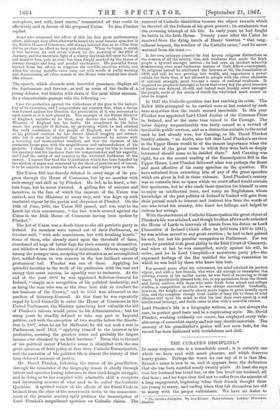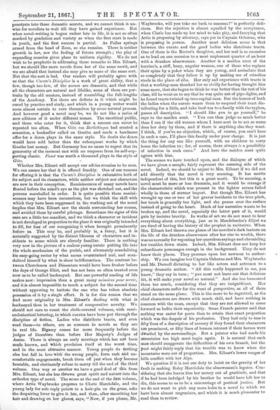THE CURATE'S DISCIPLINE.* IN many respects this is a remarkable
novel ; it is certainly one which we have read with much pleasure, and which deserves hearty praise. Perhaps the worst we can say of it is that Mrs. Eiloart's name is new to us, and it appears from the dedication that she has been married nearly twenty years. At least she says that her husband has loved her, or she has loved her husband, all that time ; and we hope they had not to suffer from the miseries of a long engagement, beginning when their friends thought them too young to marry, and ending when they felt themselves too old to marry with the proper enthusiasm. We have no desire to
7'he Curates Discipline . By Al a e.Biloart. Three MUM. London : Hurst and penetrate into these domestic secrets, and we cannot think it un- wise for novelists to wait till they have gained experience. But when novel-writing is begun rather late in life, it is not so often marked by gradation and variety as when the first start is made in youth, and the first success is partial. As Pallas springs armed from the head of Zeus, so she remains. There is neither growth in her, nor the feeling of future strength ; the play of expanding muscles gives place to uniform rigidity. We do not wish to be prophetic in addressing these remarks to Mrs. Eiloart, but we should like more novels from her of the same merit, and we are afraid that instead she may give us more of the same sort. Not that the sort is bad. Our readers will probably agree with us that the Curate's Discipline is a work of great ability, that a few, though too few, of the scenes are dramatic, and that while all the characters are natural and lifelike, some of them are por- traits by the old masters, instead of resembling the full-lengths of the Academy. Yet there are defects in it which might be cured by practice and study, and which in a young writer would seem almost certain to cure themselves by some natural process. And however good a novel may be, we do not like a series of new editions of it under different names. The uncritical public, and those who cater for it, think that a success can never be repeated too often. When Glitz von Berlichingen had created a sensation, a bookseller called on Goethe and made a handsome offer for a dozen plays in the same style. No doubt the dozen would have sold better than the subsequent works by which Goethe lost money. But Germany has no cause to regret that its generosity of the moment met with no response from its self-sup- porting classic. Faust was worth a thousand plays in the style of
• Whether Mrs. Eiloart will accept our advice remains to be seen. We can assure her that it is offered frankly. One of our reasons for offering it is that the Curate's Discipline is exhaustive both of its subject and its characters, while neither subject nor characters are new in their conception. Reminiscences of many novels have Boated before the mind's eye as the plot was sketched out, and the persons marshalled in order. It is quite possible these remini- scences may have been unconscious, but we think the skill with which they have been suppressed in the working out of the novel implies that Mrs. Eiloart saw the shoals surrounding her course, and avoided them by careful pilotage. Sometimes the signs of this care are a little too manifest, and we think a character or incident is not developed in proportion to the place it was originally intended to. fill, for fear of our recognizing it when brought prominently before us. This may be, and probably is, a fancy, but it is naturally suggested by the distant likeness of characters and in- cidents to some which are already familiar. There is nothing very new in the picture of a zealous young curate putting life into the whole mechanism of the parish, and alternately scandalizing his easy-going rector by what seems overstrained zeal, and scan- dalized himself by what is sheer indifferentism. The contrast be- tween Churchmen and Dissenters would have been fresher before the days of George Eliot, and has not been so often treated even now as to be called hackneyed. But one powerful reading of life makes morn impression than a great many mentoires pour servir, and it is almost impossible to touch a subject for the second time without appearing to imitate the one who has taken absolute possession of it by a single effort. It is for this reason that we find more originality in Mrs. Miloart's dealing with what is
hackneyed than in her treatment of comparative novelty. We should not care to count the cloth-covered volumes, with semi- ecclesiastical lettering, in.which curates have been put through the discipline of fiction. Ladies who distribute tracts, and even read them—to Others, are as common in novels as they are
in real life. Bigamy comes far more frequently before the judges of literature than before Her Majesty's Judges of Assize. There is always an early marriage which has not been made known, and Which proclaims itself at the worst time, and in the most obtrusive manner. Young people do nothing else but fall in love with the wrong people, form rash and un- comfortable engagements, break them off just when they become bearable, and obstinately refuse to marry till the end of the third volume. One way or another we have a good deal of this from Mrs. Eiloart, but she has thrown great spirit and nature into the orthodox type of novel. The scene at the end of the first volume, where Artie Waybrooke proposes to Clarie Marchdale, and the young lady for sole reply points to a hair-pin on the grass, asks the despairing lover to give it her, and then, after smoothing her hair and drawing on her gloves, says, " Now, if you please, Mr. Waybrooke, will you take me back to mamma?" is perfectly deli- cious. But the rejection is almost equalled by the acceptance, when Clarie has made up her mind to take pity, and fancying that Artie is proposing by attorney, says yes to Captain Osborne, who is proposing in person. Another most delicious scene is that between the curate and the good ladies who distribute tracts. One of them is the Rector's daughter, and her zeal is so excessive as to lead on one occasion to a most unpleasant quarter of an hour with a drunken alwswoman. Another is a maiden aunt of the heroine's, a stiff, bony, angular woman, one of those who replace their spine by a poker when they are young, and assimilate that so completely that they follow it up by making use of crinoline steels in the place of ribs. Her only sad experience with tracts is that a working-man thanked her so civilly for having brought him some more, that she began to think he was better than the rest of his class, till he went on to say that he was quite out of pipe-lights, and he found tracts twisted up into capital ones. But the horror of both the ladies when the curate wants them to suspend their tract dis- tributing for a little, and take beef-tea to a family with the typhus, passes all description. "I should like you to go yourself," he says to the maiden aunt. " You can then judge so much better than I can if the old woman whom I have sent in to act as nurse does her duty by them, and if there is anything else they want. I think, if you've no objection, which, of course, you can't have in such a case, I'll place this family under your charge. It is just the thing for any one like yourself, with no children to carry home the infection to ; for, of course, there always is a possibility of infection in such cases." And here the maiden aunt quite agrees with him.
The scenes we have touched upon, and the dialogue of which we have given a sample, fairly represent the amusing side of the novel. Indeed, we should be unjust to Mrs. Eiloart if we did not add directly that the novel is very amusing. It has merits independent of this, but this is a great merit. To be amusing, a novel must be more or less dramatic, and it would be strange if the characteristic which was present in the lighter scenes failed wholly in those of sterner import. But though Mrs. Eiloart has wrought up one or two of her graver incidents to the true pitch, her touch is generally too light, and she passes over the surface instead of going to the heart. Much of her narrative wants to be broken up, and the novel, especially the latter part of it, would gain by incisive brevity. In works of art we do not want to hear everything about everything, just as in Mendelssohn's Elijah we are tired of having the history of the prophet in recitative. When Mrs. Eiloart had thrown one gleam of the novelist's dark lantern on the life of the drunken alinswoman after her rise to wealth, there was no necessity for repeating her querulous sayings and chronicling her tumbles down stairs. Indeed, Mrs. Eiloart does not keep her subordinate personages enough in the background. They do not know their places. They presume upon her newness to author- ship. We can imagine her Captain Osborne and Mrs. Waybrooke and Mr. Darnell dictating to her like actors and actresses to a young dramatic author. " All this really happened to me, you know," they say in turn ; " you must not leave out that delicious bit, it will make your novel so natural." And she has humoured them too much, considering that they are insignificant. Her chief characters suffer for the want of perspective, as all of them stand on the same plane. This is the more to be regretted, as the chief characters are drawn with much skill, and have nothing in common with the mass, except that they are not allowed to come forward as befits their superiority. Some French painter said that nothing was easier for poets than to attain that exact proportion which was the despair of his profession. They had only to toss in fifty lines of a description of scenery if they found their characters too prominent, or fifty lines of human interest if their heroes were &taxied by the surroundings. But a painter who had made his mountains too high must begin again. It is natural that each
man should exaggerate the difficulties of his own branch, but the poet might fairly reply that his trouble was to know when the mountains were out of proportion. Mrs. Eiloart's lower ranges of hills conflict with her Alps.
We question if it is not our duty to insist on the gravity of her fault in making Roley Marchdale the almswoman's legatee. Con- sidering that she leaves him her money out of gratitude, and that if he had been indulged by his brother he would have left her to die, this seems to us to be a miscarriage of poetical justice. But we do not want to pick any more holes in a novel to which we have been almost ungracious, and which it is much pleasanter to read than to review.































 Previous page
Previous page